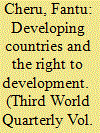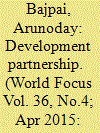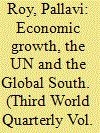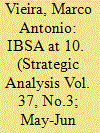| Srl | Item |
| 1 |
ID:
145878


|
|
|
|
|
| Summary/Abstract |
The end of World War II, and the establishment of the United Nations in 1945, unleashed great expectations of a brave new world, in which the promotion and protection of human rights would become the central organising principle of international relations. This article examines the long struggle that African countries, joined by other developing countries, have waged at the UN for a New International Economic Order (NIEO) and for the right to development to be recognised as legally enforceable and universal. To date, however, the right to development has not entered the practical realm of planning and implementation at the national and international levels. The article assesses the internal and external factors that have prevented countries in the Global South from fulfilling the rights of their citizens to development and from moving the agenda forward.
|
|
|
|
|
|
|
|
|
|
|
|
|
|
|
|
| 2 |
ID:
138361


|
|
|
|
|
| Summary/Abstract |
India needs to address various challenges to make her development partnership more effective. If India's development partnership has to work as 'soft power' instrument of India's economic diplomacy, it has to be motivated by the spirit of sharing, equal partnership, mutual benefit, and India's entitled national interest.
|
|
|
|
|
|
|
|
|
|
|
|
|
|
|
|
| 3 |
ID:
145879


|
|
|
|
|
| Summary/Abstract |
The most visible success of the UN system has been to foster a multilateral structure of international governance that has proved resilient since World War II. However, this structure has failed to provide a financing mechanism to help developing countries achieve the structural transformations required for broad-based economic growth. Indeed, the Global South has also had many chances to reorder the international financing system but has failed thus far to do so. The global distribution of power remains with the USA and the West; even rising China plays by the contract-enforcement rules of the North in terms of global economic governance. Another critical reason why financing has not been readily available, despite the magnitude of capital flows between developed and developing economies, is that it comes with conditions that induce little ‘effort’ to result in capability development. Policies should be devised to overcome this weakness but they are unlikely within a multilateral framework. However, if the USA and China agree to work together on alternative multilateral systems promoted by the Global South, the potential for positive change increases.
|
|
|
|
|
|
|
|
|
|
|
|
|
|
|
|
| 4 |
ID:
120412


|
|
|
|
|
| Publication |
2013.
|
| Summary/Abstract |
This commentary engages with the IBSA model of South-South development assistance. It focuses on the IBSA Trust Fund to demonstrate the growing political relevance of the partnership in development assistance initiatives. This is followed by an analysis of Brazil's increasing participation in South-South development assistance in many developing countries around the world. I argue that the strategic mission for the IBSA states in the coming decades, as a new normative/ordering power in international relations, is to further its political authority and legitimacy by expanding and refining its South-South development assistance framework. This can be done by integrating new thinking on environmental sustainability as a central-albeit neglected-pillar of their common framework.
|
|
|
|
|
|
|
|
|
|
|
|
|
|
|
|